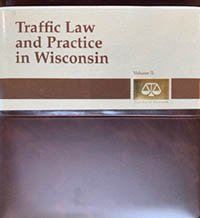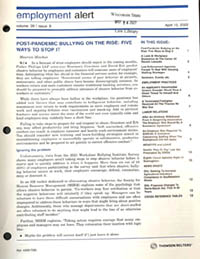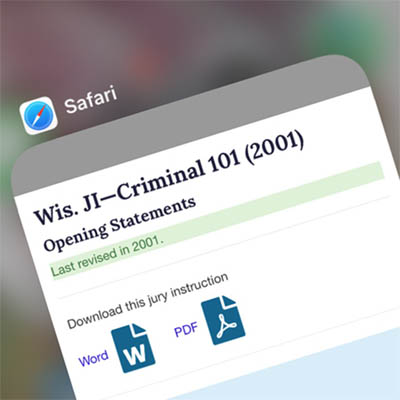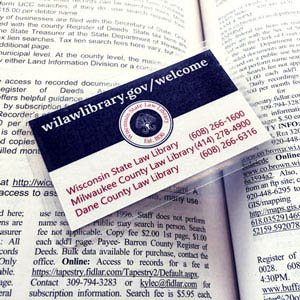WSLL @ Your Service June 2022
Contents
Researching Wisconsin Administrative Law - Michael Keane
When citizens think of the law it is not unusual to think first of either the legislature or the courts, where legal disputes are commonly resolved. However, it is important to remember that the executive branch of our three-branch government also plays an important part in the creation and interpretation of law.
It is the role of the executive branch to administer the government in conformity with the laws enacted and interpreted by the other two branches of government. This is carried out with the authority granted by the legislature, and in conformity with judicial rulings that delineate the interaction of the three branches. Throughout the 20th Century, this administrative framework became more formalized as the regulation of society by enactments of the legislature became less practical.

Administrative Code
The fundamental source for administrative regulation in Wisconsin is the Administrative Code. Each executive branch agency produces its own regulations within its own section of the code. These are designated by the name of the agency with a standard abbreviation. The Department of Administration (Adm); Department of Children and Families (DCF); Department of Health Services (DHS); Department of Natural Resources (NR); and Department of Revenue (Tax) are among the most prominent. The Administrative Code is online and can be searched by subject in a detailed index.
Administrative rules
Administrative rules are proposed by the agency. Rules pass through a legislative review process before being added to the Administrative Code. They are proposed to the Rules Clearinghouse in the Legislative Council as a Clearinghouse Rule where each is assigned its own unique number. The rule is then referred to the appropriate standing committee in each house of the legislature for hearings and review. Clearinghouse Rules are online, as are pending rules (still going through the review process). There is also a subject index to look up rules by topic.
A proposed rule normally has a public hearing at the agency before it is reviewed by the legislature. The agency prepares a scope statement that details the effect of the rule, the reasons for its promulgation, and, most crucially, the statutory authority of the agency to create the rule. During the legislative review process, the rule may have a hearing before one or more of the legislative standing committees involved in the review. If the standing committees do not object to the rule, the rule is submitted to the Joint Committee for the Review of Administrative Rules, where, during a 30 day review period, the committee may delay promulgation of the rule for the duration of the review process, or may present an indefinite objection, which will prohibit the promulgation of such a rule until the enactment of legislation specifically authorizing the action. The Joint Committee for the Review of Administrative Rules and the standing committees may also approve the rule or offer specific modifications. A calendar of scheduled legislative rules hearings is available online.
Agencies may also offer Emergency Rules, which can bypass the legislative review process for a time and go into effect immediately, but require a finding of emergency by the executive agency. Emergency Rules can be browsed or may be discovered while reading related sections of the Administrative Code.
New rules and emergency rules can be promulgated by publication in the Administrative Register. The Administrative Register is also the primary source for on-going agency regulatory action in rule-making, and serves an important role in documenting the evolution of rule-making in Wisconsin. The Register, which is published monthly, provides notice of emergency rules in effect, scope statements for proposed rules, notices of agency public hearings, and approved rules filed for incorporation in the Administrative Code. In addition, the Register provides the text of Executive Orders.
Administrative Procedures
Wisconsin law with respect to administrative procedure is, for the most part, found in Wisconsin Statute chapter 227. The Rules Clearinghouse of the Legislative Council has also produced a comprehensive manual on rules procedure in Wisconsin.
New Books - Kari Zelinka

New Edition! Traffic Law and Practice in Wisconsin, 6th ed, 2022
Call Number: KFW 2696 .T725
The updated 6th edition of Traffic Law in Wisconsin has just been published. If you need to get up to speed on general traffic offenses involving the driving privilege, commercial driver's licensing, common moving traffic violations or impaired driving offenses, look no further. In this two volume set from the State Bar, you'll also find sample OWI arrest forms, blood-alcohol charts and information on traffic safety school.
The 6th edition contains the following updates:
- Changes in regulations regarding ignition-interlock devices
- Discussion of penalty structure for operating-while-intoxicated offenses with two new practice tips related to lifetime driver-license revocations
- Statutory amendments that affect how appeals from municipal court to circuit court are handled

New Issue! Employment Alert, v. 39, issue 8, April 15, 2022
Call Number: KF 3315 .E46
Employment Coordinator, published by Thomson Reuters, features a biweekly newsletter, titled Employment Alert. If you are a human resources professional, employment law attorney, or in-house counsel, you may benefit from the practical, readable, concise advice in this newsletter. Stay up to date on legal developments in the following areas:
- Union relations
- Medical leave
- Occupational safety
- Wrongful discharge
- Wage and hour regulation
- Race and sex discrimination
You can browse the latest issue in print at the library or electronically via our Westlaw subscription on our patron computers at the Wisconsin State Law Library. Examples of articles in the latest issue include:
- Post-pandemic bullying on the rise: five ways to stop it
- A look at workplace biometrics at the enter of recent lawsuits
- An applicant's uncontrolled seizure disorder would pose a direct threat to himself and others.
- Seattle 'play or pay' law not preempted by ERISA
![]() See our latest New Titles list for a list of new books and other resources.
See our latest New Titles list for a list of new books and other resources.
For assistance in accessing these or other resources, please contact our Reference Desk.
Tech Tip - Heidi Yelk
Is it time to shop mobile browsers?

According to recent data, Apple's Safari is the most commonly used mobile browser at 54% of the market, followed closely by Chrome. This is not surprising, as the iPhone consistently leads the smart phone market, followed by Android.
If you find your current browser lacking or have simply been using the browser that came with your phone, you may be interested in looking at new options. Privacy and speed are both features touted by many of the alternative browsers. A recent article in Lifewire provides an overview of mobile browsers, with pros and cons of each.
In my own testing, I have tried Firefox Focus, Opera and Brave. All three are easy to use and provide a fresh browser experience. Firefox Focus, aimed at privacy, blocks trackers and makes it simple to clear browsing history with one quick tap on the trash can icon. Opera has a similar feel to Safari but provides more tools at your fingertips, including "find in page" and "privacy mode." Opera's "My Flow" feature also encourages easy sharing from the mobile browser to Opera on a PC. If you like tabs, Brave provides tabbed browsing that is easy to navigate and most similar to using tabs in a desktop browser.
In addition to the Lifewire article linked above, TechRepublic's review and picks by Techradar provide additional information and ideas for choosing a mobile browser that's right for you.
Library News - Carol Hassler
Fine free and longer check-outs
In case you missed it, in the past few years we made a big change! We've extended the old one-week checkout period to 30 days, giving you more time to consult the books you need. Our avid researchers can now renew for another full 30 days as well.
We understand that life and work can intervene in returning books on time, which is why we have gone fine free. If you lose or damage a book, we will assist with billing you for the replacement cost . But overdue fines are no longer charged.
Research Tips in InsideTrack
In this month's State Bar of Wisconsin InsideTrack, librarian Carol Hassler discusses the tools and knowledge sources every new lawyer should know. In Legal Research: New Lawyers: Grow Your Practice by Reusing Knowledge, get quick tips for finding forms and checklists to kick start your own work.
Libraries Closed for Holiday
All three libraries will be closed on Monday, July 4th in observance of the Fourth of July. Send questions and requests to wsll.ref@wicourts.gov or leave a message at 608-267-9696. We'll get back to you on Tuesday, July 5th.
Welcome back to in-person classes
Join us at the David T. Prosser Jr. State Law Library for our first in-person training in a couple of years, and a brand-new class!
Basic Knowledge for Legislative Research in Wisconsin
Wednesday, June 15, 12:00 - 1:00 p.m.
Location: David T. Prosser Jr. State Law Library - Register for Basic Knowledge for Legislative Research in Wisconsin
FREE
Get an introduction to the basic tools for understanding the legislative process: the format of legislative documents, the vocabulary, tips on reading statutes, and using information associated with the statutes to better understand and more easily research state law. This class is a great prequel to drafting file research and is appropriate for any legal researcher interested in the Wisconsin legislative process.
Webinar learning opportunities
Sign up for a webinar this spring! Registration in our webinars is limited to 100 and all registrations will be approved daily by the moderator. Once your registration is approved, you will get an email confirmation with connection information. Please reach out to abigail.case@wicourts.gov with questions.
Wisconsin Legislature Website
Thursday, June 23, 12:00 - 1:00 p.m.
Location: Live webinar - Register for Wisconsin Legislature Website
FREE
In this hands-on overview of the Legislature's site you'll learn how to track legislative activity, locate bills and acts, using finding aids for legislative sessions, and search the online Wisconsin Statutes. You'll also learn about notification services, and how to find publications of the various Legislative Service agencies.
June Snapshot

Government
Photo by Francis X. Sullivan
This month's featured photo continues Francis X. Sullivan's series of photos of the Capitol murals framing the first floor rotunda of the Wisconsin State Capitol. This month's photo is of one of four magnificent glass mosaics decorating the pendentives of the rotunda. Government, featured here, represents Wisconsin's executive branch of government.
We are accepting snapshots! Do you have a photo highlighting libraries, attractions or points of historical interest? Send your photo to the editor at carol.hassler@wicourts.gov to be included in a future issue.Comments Welcome!
- Contact Carol Hassler
608-266-1424
Keep Up With Current News
- Weekly updates with Library Highlights
 Subscribe to our Newsletter RSS Feed
Subscribe to our Newsletter RSS Feed

